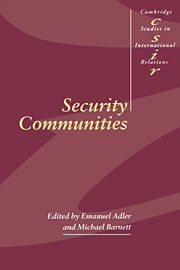Book contents
- Frontmatter
- Contents
- Notes on contributors
- Acknowledgements
- Part I Introduction and theoretical overview
- Part II Studies in security communities
- 3 Insecurity, security, and asecurity in the West European non-war community
- 4 Seeds of peaceful change: the OSCE's security community-building model
- 5 Caravans in opposite directions: society, state and the development of a community in the Gulf Cooperation Council
- 6 Collective identity and conflict management in Southeast Asia
- 7 An emerging security community in South America?
- 8 Australia and the search for a security community in the 1990s
- 9 The United States and Mexico: a pluralistic security community?
- 10 No fences make good neighbors: the development of the US-Canadian security community, 1871–1940
- 11 A neo-Kantian perspective: democracy, interdependence and international organizations in building security communities
- Part III Conclusions
- Index
- CAMBRIDGE STUDIES IN INTERNATIONAL RELATIONS
3 - Insecurity, security, and asecurity in the West European non-war community
Published online by Cambridge University Press: 30 October 2009
- Frontmatter
- Contents
- Notes on contributors
- Acknowledgements
- Part I Introduction and theoretical overview
- Part II Studies in security communities
- 3 Insecurity, security, and asecurity in the West European non-war community
- 4 Seeds of peaceful change: the OSCE's security community-building model
- 5 Caravans in opposite directions: society, state and the development of a community in the Gulf Cooperation Council
- 6 Collective identity and conflict management in Southeast Asia
- 7 An emerging security community in South America?
- 8 Australia and the search for a security community in the 1990s
- 9 The United States and Mexico: a pluralistic security community?
- 10 No fences make good neighbors: the development of the US-Canadian security community, 1871–1940
- 11 A neo-Kantian perspective: democracy, interdependence and international organizations in building security communities
- Part III Conclusions
- Index
- CAMBRIDGE STUDIES IN INTERNATIONAL RELATIONS
Summary
When we use the term “integration or amalgamation” in this book,we are taking a short form to express an alternative between integration (by the route of either pluralism or amalgamation) and amalgamation short of integration. We have done this because unification movements in the past have often aimed at both of these goals, with some of the supporters of the movements preferring one or the other goal at different times. To encourage this profitable ambiguity, leaders of such movements have often used broader symbols such as “union”, which could cover both possibilities and could be made to mean different things to different men.
Deutsch et al., Political Community, 1957Western Europe is a security community. In contrast to the expectations of most contemporary theorists of security communities, this has not been achieved by erecting common security structures or institutions, but primarily through a process of “desecuritization”, a progressive marginalization of mutual security concerns in favor of other issues. This chapter's main section traces how Western Europe has gone from insecurity (1940s and 1950s), over security (1960s) and desecuritization (1970s to the mid 1980s) to reach a situation in the 1990s of re-securitization. Mutual military fears are still absent at the level of state-to-state, but more issues are today cast in security terms, economy, environment and migration. Classical political security concerns appear but are mostly conceived for “Europe” not individual states. Re-securitization raises the specter of a possible unravelling of the West European security community, because when something is constituted as a security issue this enables more extreme action. Since Deutsch defines security community in terms of the absence of war, it really is a non-war-community, and security problems can continue to unfold within it.
- Type
- Chapter
- Information
- Security Communities , pp. 69 - 118Publisher: Cambridge University PressPrint publication year: 1998
- 170
- Cited by

